Afghanistan Aid Crisis: WFP Battles Cuts Amid Taliban Restrictions
The World Food Programme (WFP) in Afghanistan reports it can only feed half of the millions in need due to international aid cuts and U.S. funding freezes. Concerns over Taliban restrictions on women and global emergencies have contributed to reduced donations, despite dire needs during harsh winters.

The World Food Programme's (WFP) operation in Afghanistan is facing significant challenges, as international aid cuts have forced the organization to feed only a fraction of the nation's millions in need. The agency's funding crisis worsened with recent U.S. aid freezes, compounding the existing financial constraints.
WFP Country Director Hsiao-Wei Lee highlighted the severe impact on Afghan lives, with many surviving on minimal sustenance like bread and tea. Aid cutbacks have been driven by Taliban-imposed restrictions on women and competing global crises, leaving grossly inadequate support for the estimated 15 million Afghans in acute food scarcity.
The future of humanitarian aid remains uncertain as global emergencies in other regions and the Taliban's controversial policies strain donor commitment, despite the pressing needs in Afghanistan. Diplomatic and humanitarian voices emphasize the importance of sustaining aid levels to meet the high demand.
(With inputs from agencies.)
ALSO READ
World Bank Approves $182 M to Address Health and Food Insecurity Crises in Sudan
Hope it will lead to safe, sustained supply of humanitarian aid to people of Gaza: India on ceasefire deal.
NZ Applauds Gaza Ceasefire, Calls for Urgent Humanitarian Aid and Path to Peace
Ceasefire Brings Surge in Humanitarian Aid to Gaza
Renewed Hope: Ceasefire Aims to Revitalize Humanitarian Aid in Gaza










